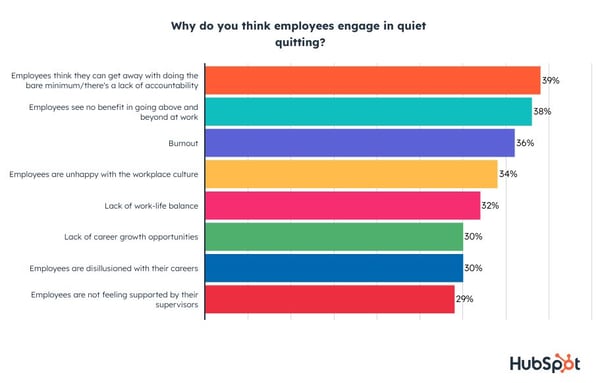What Marketing Leaders Think About Quiet Quitting [Executive Leadership Data]

By mbretous@hubspot.com (Martina Bretous)
Back in September, we covered quiet quitting: Specifically, what it is, how the term got popular, and ways to address it.
Now, we’re hearing directly from marketing leaders and getting their thoughts on the phenomenon, courtesy of our Executive Leadership survey of 500+ leaders.
In this article, you’ll find out what they think about quiet quitters (Spoiler alert: It’s not pretty), why they think it’s happening and how they plan to address it.
What Marketing Leaders Know about Quiet Quitting
To start things off, most of the marketing leaders we surveyed (73%) say they’re familiar with the term “quiet quitting.”’ In fact, 57% agree that quiet quitting is happening to some degree within their organization.
To what extent? Well, marketing leaders think only 17% of their employees are quiet quitting. However, our consumer trends data suggests otherwise.
In our survey, 33% of full-time employees reported that they are quiet quitting their current job. Since this data is self-reported, this figure is likely higher.
Yet, 80% of leaders surveyed say they would know if an employee on their team was quiet quitting.
This suggests that two things could be happening: Employees are great at hiding the fact that they’re quiet quitting or leaders are a bit out of touch with their employees.
Regardless of where the true number lies, 57% of marketing leaders are concerned about this phenomenon and 66% have explicitly discussed how to address it with their leadership team.
What Marketing Leaders Think about Quiet Quitters
It’s fair to say that marketers leaders aren’t fond of quiet quitting – 77% of those surveyed say it’s “unacceptable.”
Despite studies suggesting that quiet quitting is a reaction to bad management, that’s now how most marketing leaders see it.
64% of those surveyed believe quiet quitting is a reflection of poor work ethic, while one-third of respondents view it as setting healthy boundaries.

When asked why they believe employees engage in quiet quitting, 39% of respondents placed the blame on employees and say it’s due to a lack of accountability.
- 38% said employees see no benefit in going above and beyond at work.
- 36% said burnout.
- 34% said employees are unhappy with the workplace culture.
- 32% said lack of work-life balance.
Our Consumer Trends survey does suggest that burnout and workplace culture play a major role in job satisfaction.
The report found that of the 29% of consumers who are considering leaving their current job, 25% say the reason is burnout and 20% say they’re not happy with the workplace culture.
Now that we know how marketers leaders view both quiet quitting and those who engage in it, let’s cover what they plan to do about it.
How Marketing Leaders Plan to Address Quiet Quitting
Although most marketing leaders believe quiet quitting …read more
Source:: HubSpot Blog

![→ Free Report: The Executive Marketing Leadership Survey [Download Now]](https://no-cache.hubspot.com/cta/default/53/41a58f0d-a829-4a22-840a-327a243d781a.png)




